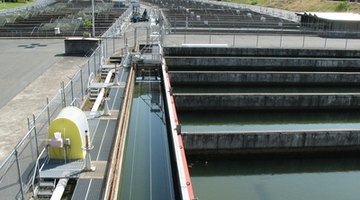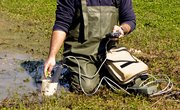Shrimp farming is a major producer of shrimp for human consumption. Originally a technique used in Thailand, shrimp farming for commercial production has become popular worldwide because it is economically viable and does not deplete the ocean's natural resources. Many universities in the United States offer aquaculture programs for those interested in learning the shrimp farming business.
Kentucky State University
Kentucky State University's aquaculture program works with many types of commercially viable farmed seafood, including shrimp. Their department has ongoing research on genetic improvement of Freshwater Prawns. Students can earn an Aquaculture Master of Science or an undergraduate Aguaculture minor. Online courses include Fish Genetics, Principles of Aquaculture, Fish Reproduction and Spawning Techniques, and Fish Diseases. The aquaculture facilities include multiple research ponds, a hatchery, a paddlefish greenhouse and a shrimp greenhouse.
Kentucky State University 103 Athletic Road Frankfort, Kentucky 40601 502-597-8103 ksuaquaculture.org
University of Wisconson-Madison
The state of Wisconsin has a well-established aquaculture program with more than 350 fish farmers raising a variety of food, game and bait fish. Both undergraduate and graduate programs in aquaculture are available at UW-Madison. Aquaculture students will train and research in the Water Science and Engineering laboratory and the Lake Mills State Fish Hatchery. The hatchery features over 40 ponds, two indoor raceways, eight outdoor raceways and an abundant supply of flake water. The aquaculture program at UW-Madison prepares students for both academic and industry positions in aquaculture.
University of Wisconsin-Madison Aquaculture Program Department of Animal Sciences 658 Animal Sciences 1675 Observatory Drive Madison, WI 53706 608-263-1242 ansci.wisc.edu
University of Arkansas at Pine Bluff
The aquaculture program at the University of Arkansas at Pine Bluff is the only comprehensive aquaculture program within the Arkansas university system. It supports the state's growing aquaculture industry by training students at both the undergraduate and graduate levels for academic and industry aquaculture positions. Educational emphasis is on hands-on training in earthen ponds and small, experimental and large commercial rivers and lakes. Students work in labs equipped with sophisticated modeling software. They apply analytical procedures to analyze samples from the field, including information on fish health, disease, growth and food habitat. Students receive real-world training by working with and assisting Arkansas aquaculture farmers.
University of Arkansas at Pine Bluff Department of Aquaculture and Fisheries 1200 North University Drive Mail Slot 4912 Pine Bluff, AR 71601 uaex.edu
Related Articles
Writer Bio
A native of Austin, Texas, Andrea Julian began freelance writing in 2008 while living abroad in Guatemala. She has a background in biology and a passion for traveling. She writes for various websites, including eHow, Helo and The Savvy Explorer. Julian holds a bachelor's degree in biology from Texas State University.











